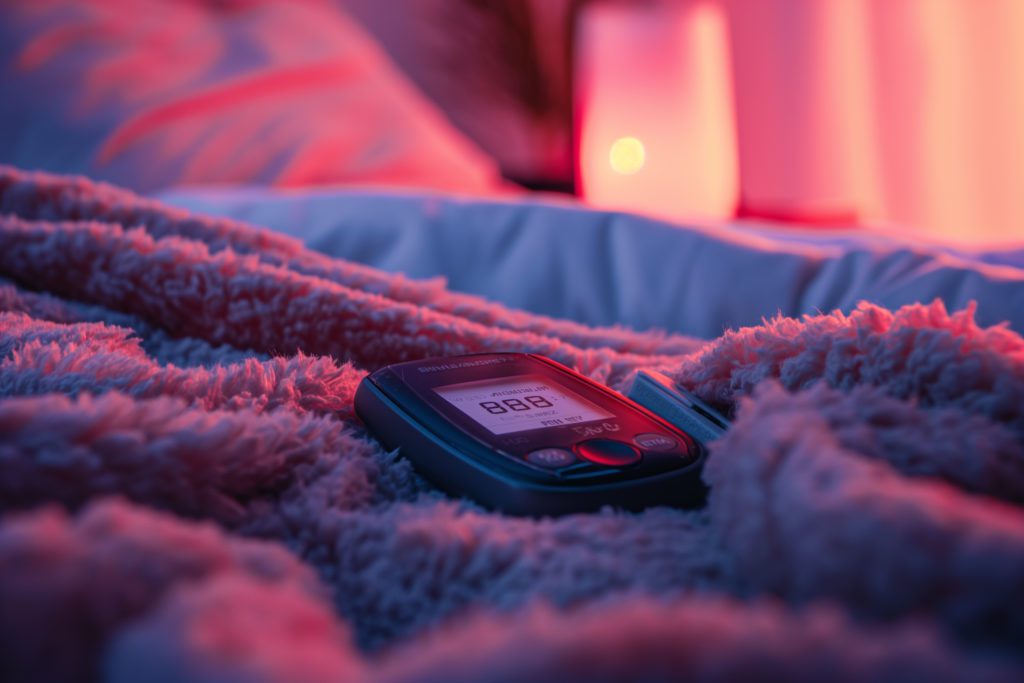
Circadian Rhythms and Blood Sugar—the Hidden Connection
Discover how your body's internal clock influences blood sugar levels and what it means for diabetes management.

What your internal clock means for your metabolic health
Think of yourself as a night owl or an early bird? That internal clock does more than determine when you hit peak productivity—it’s also intricately involved in how your body manages blood sugar.
Whether you’re up at dawn or active at midnight, your circadian rhythm is quietly influencing your metabolic pathways, having a say in everything from energy dips to how efficiently you process sugar. For those managing diabetes or just aiming to stabilize glucose levels, getting to grips with this rhythm could be the missing piece to living your life to the fullest.
Let’s explore how syncing your biological clock might just be the secret to optimizing your health.
What are circadian rhythms?
Circadian rhythms are like the conductor of an orchestra, dictating the ebb and flow of our body’s biological processes over 24 hours. These internal clocks are ingrained in nearly every living organism and are primarily regulated by the light-dark cycle of our environment. In humans, they are governed by a master clock, a tiny but mighty area in the brain called the suprachiasmatic nucleus (SCN) of the hypothalamus.
But these rhythms go beyond just telling us when to feel sleepy or wake up. They influence a wide array of biological functions—like hormone release, including insulin, which is crucial for blood sugar management. They dictate our eating habits, cueing when we feel hungry and when we're satiated. Moreover, they regulate cell regeneration and repair processes, ensuring that our bodies effectively recover from daily wear and tear.
So, while you might think of your circadian rhythm only when you’re working on your sleep, it's actually bustling behind the scenes all day (and night). This internal clockwork regulates everything from your heartbeats to your snacks, playing a pivotal role in health and well-being.
Truly understanding these rhythms can lead to more than just a better night’s sleep—it can help you take steps to optimize your metabolic health, impacting everything from mood to meal times.
Zooming in on circadian rhythms and blood sugar
The link between your body’s circadian rhythms and glucose metabolism is a profound one, intricately woven into how well you manage energy throughout the day. Not only do these internal clocks schedule your sleep; but they also dictate when your body should ramp up insulin production, a hormone that regulates blood sugar levels by facilitating the absorption of glucose into cells for energy.
During the day, particularly in the morning, insulin sensitivity is at its peak. This means your body can use glucose more effectively after you eat, thanks to a boost from circadian-induced hormonal influences. However, as the day turns into night, insulin sensitivity naturally declines as it’s a mechanism originally meant to help our ancestors conserve energy through the night when food wasn't readily available.
But here’s the twist: modern lifestyles often clash with these ancient rhythms. Late-night snacking or irregular sleep patterns can throw these processes off balance. When you eat at times when your body is winding down for rest, insulin isn't as effective at managing the incoming sugar.
Over time, this misalignment can lead to higher overnight blood sugar levels, reduced insulin sensitivity, and ultimately, an increased risk of developing type 2 diabetes.
Disturbances in circadian rhythms—like those caused by shift work, all-nighters, or chronic sleep deprivation—further exacerbate these issues, highlighting how crucial it is to keep our internal clocks running smoothly for optimal glucose metabolism. Aligning our eating, activity, and sleep schedules with circadian rhythms can help maintain better blood sugar control and reduce the burden on our metabolic health.
Managing diabetes with circadian science
Here’s a wake-up call: one study showed that individuals skimping on quality sleep increased their risk of developing type 2 diabetes by as much as 40%. It turns out that syncing your daily routines with your body’s internal clock may sharpen your glucose control and ramp up insulin efficiency.
Let’s look at some practical ways to align your lifestyle with your circadian rhythms to potentially ease diabetes management or lower your risk:
- Time your meals wisely
Hit your meals earlier when your insulin sensitivity is at its peak, and try to keep dinner lighter and earlier in the evening. Snacking right before bed? Not the best idea, as your body’s nighttime mode isn’t great at sugar management. - Plan exercise for daylight
Lace up your sneakers when the sun is out. Morning or early afternoon exercise can naturally boost your metabolism and keep blood sugar levels more stable, thanks to better insulin use during these hours. - Set consistent wake-up and bedtimes
Aim for 7-9 hours of solid sleep by sticking to a regular bedtime and wake-up schedule. Consistent good sleep isn’t just about feeling rested—it’s a cornerstone of metabolic health. - Track your sleep
Consider using a sleep tracking app. It can help you understand the quality of sleep you’re getting and how to tweak your habits for the best night’s sleep—vital for keeping your glucose levels in check.
Fine-tuning your day according to your circadian rhythms helps you set up a healthier, more regulated tomorrow. Remember, while these strategies are beneficial, they're part of a bigger picture.
Always consult with a healthcare provider to tailor any lifestyle changes to your specific medical needs, ensuring they complement your overall diabetes management plan.
Time your health to perfection
The link between circadian rhythms and glucose metabolism is clear: aligning your daily habits with your internal clock can significantly enhance your health. So, take the time to sync your routines—it's a straightforward strategy that could dramatically improve your diabetes management or even help prevent it. Adjust your clocks and maybe, just maybe, you'll outsmart your sweet tooth!
FAQ
How does aging impact circadian rhythms and glucose metabolism?
As people age, circadian rhythms tend to weaken, leading to impaired glucose metabolism and increased risk of insulin resistance. Aging affects hormone production and sleep patterns, which can contribute to poor blood sugar control and a higher likelihood of developing metabolic disorders.
How does aging impact circadian rhythms and glucose metabolism?
Certain medications can disrupt circadian rhythms and affect blood sugar levels. For example, glucocorticoids like prednisone are known to interfere with the body's natural hormonal cycles, potentially leading to poor regulation of blood sugar, weight gain, and an increased risk of diabetes. Adjusting the timing of such medications to align with the body's natural glucocorticoid cycle—peaking in the early morning—might mitigate these adverse effects.
How does shift work impact blood sugar levels?
Shift work, particularly night shifts, can misalign circadian rhythms, leading to decreased insulin sensitivity and higher blood sugar levels. Irregular sleep and eating patterns associated with shift work increase the risk of metabolic disorders, including type 2 diabetes.
Does exposure to artificial light affect blood sugar regulation?
Artificial light exposure at night can disrupt circadian rhythms by suppressing melatonin, a hormone involved in regulating glucose metabolism. This disruption can lead to insulin resistance and increased blood sugar levels, raising the risk of diabetes over time.
How does the body's internal clock influence insulin production?
The circadian clock regulates insulin secretion, with peak sensitivity in the morning and a gradual decline throughout the day. This biological rhythm helps optimize glucose metabolism, but disruptions can impair insulin efficiency and lead to blood sugar imbalances.

Written by
Georgia Austin
Professionally trained copywriter, editor, and content marketing strategist with over 7 years of experience—working with brands like Nike, Siemens, Toshiba, Tommy Hilfiger, Culture Trip, and Klook.
Download Pillow
Get help
Press & News
Legal
Connect
X (Twitter)
Company
Copyright © Neybox Digital Ltd.



